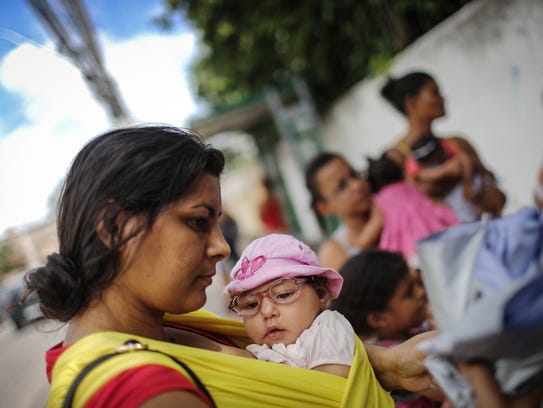New research points the way toward a potential vaccine against Zika, and may explain why the formerly mild virus exploded with such fury when it arrived in Brazil.
A pair of studies published Thursday focus on Zika's complex relationship with a related virus called dengue, a common illness in Latin America and the Caribbean that causes flu-like symptoms. Dengue is spread by the same mosquito species as Zika, and the two viruses are so similar that blood tests sometimes can't tell the two apart.
When people are infected with dengue, or any virus, the immune system releases key proteins called antibodies to neutralize the invaders. Authors of a study published Thursday in Nature found that two of the antibodies the body makes to fight dengue also prevent Zika infections.
That finding could help scientists develop vaccines against Zika and dengue, said study coauthor Juthathip Mongkolsapaya, a researcher at Imperial College London. Scientists also might be able to use these antibodies to treat Zika, she said.
Several groups are already working on Zika vaccines.
Inovio Pharmaceuticals announced this week that it has received Food and Drug Administration permission for a small, early clinical trial of a Zika vaccine it's developing with GeneOne Life Science. The National Institute of Allergy and Infectious Diseases is pursuing four types of Zika vaccines; officials there say they expect to begin clinical trials in August.
Yet the close relationship between dengue and Zika has a dark side.
There are four varieties of dengue virus. While people infected with the virus one time may develop relatively mild symptoms, those are infected a second time, with a different variety of of dengue virus, can develop severe, life-threatening complications, said Amesh Adalja, a senior associate at the Center for Health Security at the University of Pittsburgh Medical Center.
In a second paper, published in Nature Immunology, researchers found that the vast majority of dengue antibodies do nothing to stop Zika infection. In fact, a lab experiment showed that most dengue antibodies actually helped Zika viruses proliferate and invade cells. That suggests that people previously infected with dengue, whose antibodies against dengue remain in their blood, might have a more severe reaction to Zika, said Gavin Screaton, chair of medicine at Imperial College London.
These results lend support to similar findings from Florida Gulf Coast University and the University of Pittsburgh Center for Vaccine Research.

Mother Jusikelly da Silva holds her 7-month-old daughter Luhandra, who was born with microcephaly, as she wears her new glasses while waiting for a bus on June 2, 2016 in Recife, Brazil. (Photo: Mario Tama, Getty Images)
Not everyone is convinced that past dengue infections can make Zika cases more severe.
While dengue antibodies may exacerbate Zika infections in the lab, there's no evidence that this happens in the real world, said Anthony Fauci, director of the National Institute of Allergy and Infectious Diseases.
Scientists first discovered Zika in 1947, but it was never known to cause birth defects until Brazil experienced an alarming increase last year in microcephaly, a condition in which babies are born with abnormally small heads and incomplete brain development.
Brazil has reported 1,660 cases of microcephaly, about 10 times more than usual, according to the World Health Organization. Microcephaly linked to Zika has been reported in 11 other countries or territories, including Puerto Rico, Panama, El Salvador, Colombia, Martinique, the Marshall Islands, French Polynesia and Cape Verde.
These locations have different varieties of dengue viruses, Adalja said. It's possible that some varieties of the virus are more likely to be associated with Zika complications than others.
Researchers have looked at a number of possible explanations for Zika's explosive growth, said Peter Hotez, dean of the National School of Tropical Medicine at Baylor College of Medicine in Houston. It's possible Zika's spread has been aided by environmental factors, such as climate change, poverty and urbanization. It's also possible the virus has mutated.
To really understand whether dengue antibodies exacerbate Zika infections, researchers will need to study pregnant women, said Ernesto Marques, scientific director of Cura Zika, an international alliance between the University of Pittsburgh and Brazil's Oswaldo Cruz Foundation, known as Fiocruz.
The National Institutes of Health announced this week that it will partner with Fiocruz in a study of up to 10,000 pregnant women in areas with Zika outbreaks, beginning with Puerto Rico and expanding to Brazil and Colombia.
Leaders of the new study will study whether a past dengue infection increases the risk of complications on pregnant women and their babies. Researchers also will compare the health of babies born to mothers infected with Zika virus and those who were not, recording rates of miscarriage, premature birth, microcephaly, malformations of the nervous system and other complications.
Researchers will study whether these problems are more common in women who had symptoms of Zika compared to those with no symptoms. Only about 20% of Zika patients develop symptoms, which include rash, fever, joint pain and pink eye. Researchers also will study whether complications are more common in women infected early in pregnancy compared to those infected later. Doctors will follow women throughout pregnancy and for six weeks after delivery.
